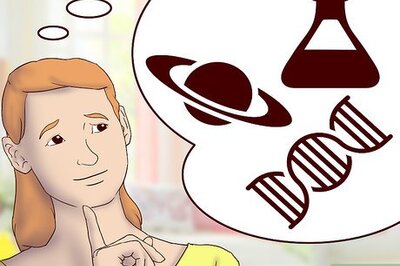
views
David Lynch's films are well known for their portrayals of grotesque suburbia, where social and mental infection lurks just under the squeaky-clean surfaces of perfect homes. They subvert American notions of post-industrial, post-war coca-cola happiness, of perfect societies inhabited by perfect people leading perfect lives.
Lynch owes this legacy to Hitchcock, whose own area of special interest had been the dark, mysterious and arbitrary forces of nature that bubble beneath apparently ideal models of society - which in his films often took the form of suburbia.
Hitchcock's and Lynch's own marks of authorship are immediately apparent - Hitchcock dramatizes through real landscapes and real people. He reveals perversions within these real people, shocking us by showing how close chaos actually looms. Lynch constructs phantasmagorias that draw from reality rather than depict it directly - where frightening dream worlds are more real for his protagonists than the real world.
It is interesting to evoke these aspects of Lynch and Hitchcock in examining David Cronenberg's A History of Violence - the story of Tom Stall (Viggo Mortensen), who leads a perfect small-town family life until an act of violent heroism changes it all.
Finding himself in the limelight after saving his friends from being killed by a couple of escaping murderers, Stall's 'history of violence' is suddenly exposed. His criminal past criminal comes hurtling back to him when Carl Fogarty (Ed Harris) comes looking for him after seeing his picture in the papers.
Fogarty has a dead eye that Stall had once pried out with barbwire, not as Stall, but as his previous avatar - the gangster Joey Cusack from Philadelphia. Stall had worked very hard to leave that life behind, and to protect his family from it, but that was not to be.
We've seen this before, in Renny Harlin's Long Kiss Goodnight, where Geena Davis plays the perfect mom with the dark assassin past. But in Long Kiss, Davis's character's condition is clinical, induced by a drug that was meant to turn her into a vegetable. This takes the story more into the realm of Dr. Jekyll and (Mrs.) Hyde and definitely further into the realm of Hollywood. The memories spring back to her, haunt her in her dreams and threaten to take her over - spelling doom for her old life and hell for the bad guys.
In a memorable scene, Davis is seen chopping vegetables and finds herself amazed at her dexterity with a knife. She ends the scene by skewering a tossed tomato against a wall five feet away with a butcher knife as her frightened and flummoxed husband looks on.
Cronenberg brings his stamp of independent direction in his treatment of a similar subject. [Warning: some spoilers] Stall's dual personality is not a clinical condition, but a case of conscious concealment. Unfortunately for him, this leaves him no space for sympathy from his family, or from us. When the shit hits the fan, he comes through as a murdering liar to his loving wife and children. Thus, as in the works of both Lynch and Hitchcock, perfect suburbia is cleaved through the middle. Yet, where does Cronenberg differ from the two directors he draws from?
Lynch is an auteur of symbolism and metaphor. Cronenberg, like Hitchcock, pulls the message into a more palpable narrative of high realism, bringing it closer to home, immediately making it more frightening. The effect of Lynch's films is not so immediate, but lingers like an infection, buzzing like the insects he likes to show as his camera pulls into the manicured lawns outside the suburban homes in his films.
But, the absence of dream worlds and descents into dementia in History is what sets it apart from the works of both Hitchcock and Lynch. That's Cronenberg pushing the horizons of this genre. He chose to deal directly with a subject that both Hitchcock and Lynch (more Lynch than Hitchcock) have illuminated obliquely.
Unfortunately, smiling critics portray only a part of a film's success. History is hardly an audience pleaser. It stokes some of our greatest fears, given that confrontation is something that an average person likes to avoid in general. The central character is complexly written, in ways that draw an audience to sympathize with him, bringing it in conflict with its own collective conscience.
There are parallels here with Sam Peckinpah's Straw Dogs, where Dustin Hoffman played a meek little American mathematician who had to massacre a dozen violent Lake District villagers before feeling adequate before his desirable and wanton wife.
Both Straw Dogs and History touch upon our primordial, caveman instincts where confrontation is pared down to it bare bones, un-cushioned by the flab of modernity and civilization. It exposes, as Fight Club did, that a part of us is actually enthralled when this happens.
The irony that drives History is generated by the contrast between Stall's life before and after his act of heroism. His 'before' life is as close to the perfect suburban/small-town life as it can be - a loving, desirable wife, beautiful children and fulfillment from the things he does. However, as is the problem with any direct depiction of perfection, this life seems just a step away from the ridiculous.
If Cronenberg had nudged his treatment only a little along this path, he would have been walking in Lynch country. I feel he resisted, but only so much; leaving us to wonder whether the ridiculously sweet wish-fulfillment of Stall's small-town life was intended to be shown as absurd or not. But this ambivalence disappears as more of Stall's past is revealed, and we're left with little to think about except for the spillage of blood that is to follow.
Shall we question the desirability of this river of blood? Violent cinema is immediately condemned. It holds a slightly more respectable place on the scales than sexual cinema. Usually the two exist together - sex 'n' violence, like fish 'n' chips. Sex is condemned as a window to violence and violent acts. We fear the manifestations of these things in society, when our own children absorb perverse depictions of the same from our cinema and TV screens. But should violence, which forms such an intrinsic part of our psyches, be kept from cinema that has the power to show it in ways that allow us to understand it better, and in the process understand ourselves better?
Forget The Texas Chainsaw Massacre and its kin that are to violence what Debbie Does Dallas is to sex. Both these film-types glorify sex and violence in order to gratify audiences. A film like History is not trying to gratify. It has more of a tryst with and an obligation to truth.
Kudos to Cronenberg for making us think about things we'd rather not think about. Kudos to him for coming along a step further than his masters. Yet, it was difficult for him to escape condemnation as History hit the mainstream. Conservative audiences that saw the film through left with whirring subconscious minds but disgusted conscious minds.
The film's actors themselves have been known to get a little carried away by their subject. Apparently, Ed Harris smashed a glass against the floor at a press conference during the Toronto Film Festival in 2005, to underline his views on the concept of violence.
The moment a text like History begins to glorify itself and its subject like that, it loses what made it stand apart - something where conveying the truth, a very bitter one at that, was more important than the conventions that forbid its discussion and the cheap gratification that would have helped its street-credibility.
(Vasant works as a creative assistant to a film director in Mumbai) first published:June 09, 2006, 17:32 ISTlast updated:June 09, 2006, 17:32 IST
window._taboola = window._taboola || [];_taboola.push({mode: 'thumbnails-mid-article',container: 'taboola-mid-article-thumbnails',placement: 'Mid Article Thumbnails',target_type: 'mix'});
let eventFire = false;
window.addEventListener('scroll', () => {
if (window.taboolaInt && !eventFire) {
setTimeout(() => {
ga('send', 'event', 'Mid Article Thumbnails', 'PV');
ga('set', 'dimension22', "Taboola Yes");
}, 4000);
eventFire = true;
}
});
window._taboola = window._taboola || [];_taboola.push({mode: 'thumbnails-a', container: 'taboola-below-article-thumbnails', placement: 'Below Article Thumbnails', target_type: 'mix' });Latest News
Hitchcock, Lynch and finally Cronenberg
David Lynch's films are well known for their portrayals of grotesque suburbia, where social and mental infection lurks just under the squeaky-clean surfaces of perfect homes. They subvert American notions of post-industrial, post-war coca-cola happiness, of perfect societies inhabited by perfect people leading perfect lives.
Lynch owes this legacy to Hitchcock, whose own area of special interest had been the dark, mysterious and arbitrary forces of nature that bubble beneath apparently ideal models of society - which in his films often took the form of suburbia.
Hitchcock's and Lynch's own marks of authorship are immediately apparent - Hitchcock dramatizes through real landscapes and real people. He reveals perversions within these real people, shocking us by showing how close chaos actually looms. Lynch constructs phantasmagorias that draw from reality rather than depict it directly - where frightening dream worlds are more real for his protagonists than the real world.
It is interesting to evoke these aspects of Lynch and Hitchcock in examining David Cronenberg's A History of Violence - the story of Tom Stall (Viggo Mortensen), who leads a perfect small-town family life until an act of violent heroism changes it all.
Finding himself in the limelight after saving his friends from being killed by a couple of escaping murderers, Stall's 'history of violence' is suddenly exposed. His criminal past criminal comes hurtling back to him when Carl Fogarty (Ed Harris) comes looking for him after seeing his picture in the papers.
Fogarty has a dead eye that Stall had once pried out with barbwire, not as Stall, but as his previous avatar - the gangster Joey Cusack from Philadelphia. Stall had worked very hard to leave that life behind, and to protect his family from it, but that was not to be.
We've seen this before, in Renny Harlin's Long Kiss Goodnight, where Geena Davis plays the perfect mom with the dark assassin past. But in Long Kiss, Davis's character's condition is clinical, induced by a drug that was meant to turn her into a vegetable. This takes the story more into the realm of Dr. Jekyll and (Mrs.) Hyde and definitely further into the realm of Hollywood. The memories spring back to her, haunt her in her dreams and threaten to take her over - spelling doom for her old life and hell for the bad guys.
In a memorable scene, Davis is seen chopping vegetables and finds herself amazed at her dexterity with a knife. She ends the scene by skewering a tossed tomato against a wall five feet away with a butcher knife as her frightened and flummoxed husband looks on.
Cronenberg brings his stamp of independent direction in his treatment of a similar subject. [Warning: some spoilers] Stall's dual personality is not a clinical condition, but a case of conscious concealment. Unfortunately for him, this leaves him no space for sympathy from his family, or from us. When the shit hits the fan, he comes through as a murdering liar to his loving wife and children. Thus, as in the works of both Lynch and Hitchcock, perfect suburbia is cleaved through the middle. Yet, where does Cronenberg differ from the two directors he draws from?
Lynch is an auteur of symbolism and metaphor. Cronenberg, like Hitchcock, pulls the message into a more palpable narrative of high realism, bringing it closer to home, immediately making it more frightening. The effect of Lynch's films is not so immediate, but lingers like an infection, buzzing like the insects he likes to show as his camera pulls into the manicured lawns outside the suburban homes in his films.
But, the absence of dream worlds and descents into dementia in History is what sets it apart from the works of both Hitchcock and Lynch. That's Cronenberg pushing the horizons of this genre. He chose to deal directly with a subject that both Hitchcock and Lynch (more Lynch than Hitchcock) have illuminated obliquely.
Unfortunately, smiling critics portray only a part of a film's success. History is hardly an audience pleaser. It stokes some of our greatest fears, given that confrontation is something that an average person likes to avoid in general. The central character is complexly written, in ways that draw an audience to sympathize with him, bringing it in conflict with its own collective conscience.
There are parallels here with Sam Peckinpah's Straw Dogs, where Dustin Hoffman played a meek little American mathematician who had to massacre a dozen violent Lake District villagers before feeling adequate before his desirable and wanton wife.
Both Straw Dogs and History touch upon our primordial, caveman instincts where confrontation is pared down to it bare bones, un-cushioned by the flab of modernity and civilization. It exposes, as Fight Club did, that a part of us is actually enthralled when this happens.
The irony that drives History is generated by the contrast between Stall's life before and after his act of heroism. His 'before' life is as close to the perfect suburban/small-town life as it can be - a loving, desirable wife, beautiful children and fulfillment from the things he does. However, as is the problem with any direct depiction of perfection, this life seems just a step away from the ridiculous.
If Cronenberg had nudged his treatment only a little along this path, he would have been walking in Lynch country. I feel he resisted, but only so much; leaving us to wonder whether the ridiculously sweet wish-fulfillment of Stall's small-town life was intended to be shown as absurd or not. But this ambivalence disappears as more of Stall's past is revealed, and we're left with little to think about except for the spillage of blood that is to follow.
Shall we question the desirability of this river of blood? Violent cinema is immediately condemned. It holds a slightly more respectable place on the scales than sexual cinema. Usually the two exist together - sex 'n' violence, like fish 'n' chips. Sex is condemned as a window to violence and violent acts. We fear the manifestations of these things in society, when our own children absorb perverse depictions of the same from our cinema and TV screens. But should violence, which forms such an intrinsic part of our psyches, be kept from cinema that has the power to show it in ways that allow us to understand it better, and in the process understand ourselves better?
Forget The Texas Chainsaw Massacre and its kin that are to violence what Debbie Does Dallas is to sex. Both these film-types glorify sex and violence in order to gratify audiences. A film like History is not trying to gratify. It has more of a tryst with and an obligation to truth.
Kudos to Cronenberg for making us think about things we'd rather not think about. Kudos to him for coming along a step further than his masters. Yet, it was difficult for him to escape condemnation as History hit the mainstream. Conservative audiences that saw the film through left with whirring subconscious minds but disgusted conscious minds.
The film's actors themselves have been known to get a little carried away by their subject. Apparently, Ed Harris smashed a glass against the floor at a press conference during the Toronto Film Festival in 2005, to underline his views on the concept of violence.
The moment a text like History begins to glorify itself and its subject like that, it loses what made it stand apart - something where conveying the truth, a very bitter one at that, was more important than the conventions that forbid its discussion and the cheap gratification that would have helped its street-credibility.
(Vasant works as a creative assistant to a film director in Mumbai)



















Comments
0 comment